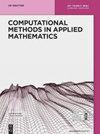针对密度可变的 MHD 系统的新型完全解耦方案
IF 1.2
4区 数学
Q3 MATHEMATICS, APPLIED
引用次数: 0
摘要
在本文中,我们首先为密度可变的 MHD 系统建立了一个新颖的一阶、完全解耦和无条件稳定的时间离散化方案。该方案结合了 gauge-Uzawa 方法和标量辅助变量(SAV)方法,成功地解耦了所有耦合项。我们证明了它的无条件能量稳定性。然后,我们给出了一阶有限元方案及其实现。此外,我们还对所提出的数值方案进行了严格的误差分析。最后,我们进行了一些数值实验来证明解耦方案的有效性。本文章由计算机程序翻译,如有差异,请以英文原文为准。
A Novel Fully Decoupled Scheme for the MHD System with Variable Density
In this paper, we first establish a novel first-order, fully decoupled, unconditionally stable time discretization scheme for the MHD system with variable density. This scheme successfully decouples all the coupling terms by combining the gauge-Uzawa method and the scalar auxiliary variable (SAV) method. And we prove its unconditional energy stability. Then we give the first-order finite element scheme and its implementation. Furthermore, we perform a rigorous error analysis of the proposed numerical scheme. Finally, we perform some numerical experiments to demonstrate the effectiveness of the decoupling scheme.
求助全文
通过发布文献求助,成功后即可免费获取论文全文。
去求助
来源期刊

Computational Methods in Applied Mathematics
MATHEMATICS, APPLIED-
CiteScore
2.40
自引率
7.70%
发文量
54
期刊介绍:
The highly selective international mathematical journal Computational Methods in Applied Mathematics (CMAM) considers original mathematical contributions to computational methods and numerical analysis with applications mainly related to PDEs.
CMAM seeks to be interdisciplinary while retaining the common thread of numerical analysis, it is intended to be readily readable and meant for a wide circle of researchers in applied mathematics.
The journal is published by De Gruyter on behalf of the Institute of Mathematics of the National Academy of Science of Belarus.
 求助内容:
求助内容: 应助结果提醒方式:
应助结果提醒方式:


